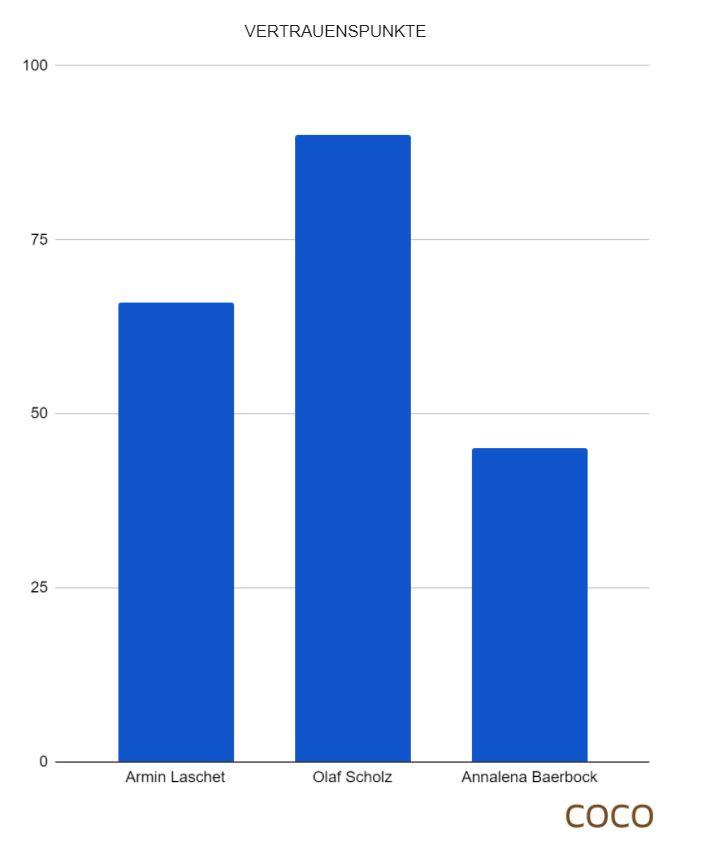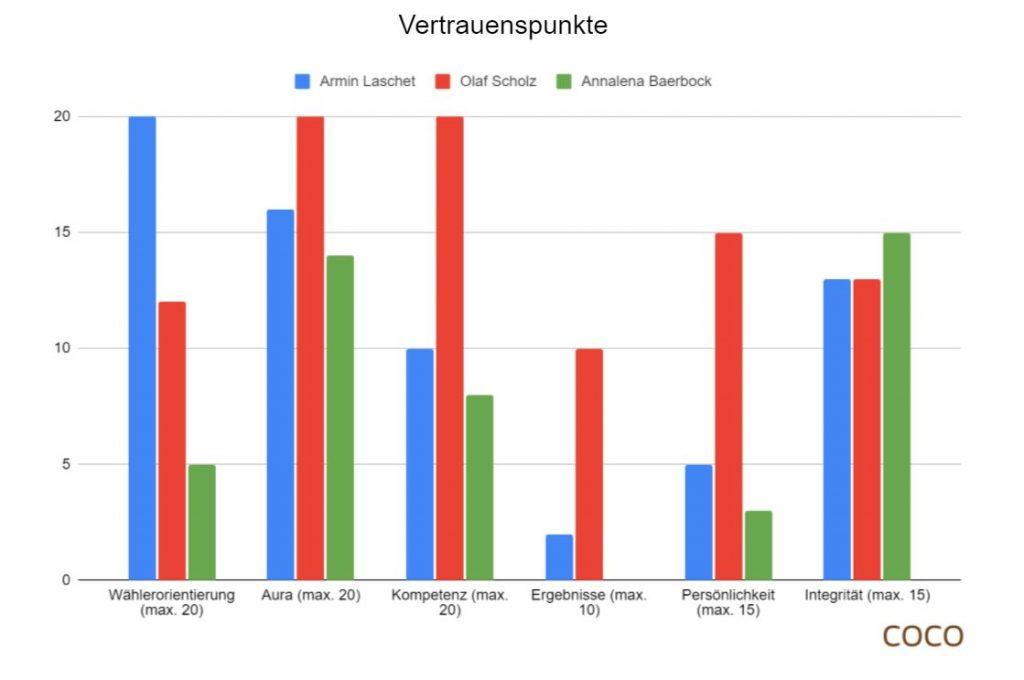Online-Studie: Wie sich die Situation von Armin Laschet, Olaf Scholz und Annalena Baerbock vorhersagen ließ und lässt (Bewertung Skala 0-100 Vertrauenspunkte)
Zur Erinnerung: Ende April wurden zuerst Annalena Baerbock und kurz darauf Armin Laschet zu den Kanzlerkandidaten ihrer Parteien nominiert. Mitte Mai lagen Union und Grüne in den Umfragen etwa gleichauf bei 25%, die SPD war weit abgeschlagen bei 15% ohne Hoffnung darauf, dass sich an diesem Zustand noch viel ändert. Zu diesem Zeitpunkt habe ich die Websites der drei Kandidaten Armin Laschet, Olaf Scholz und Annalena Baerbock mit meiner Methode des politischen Vertrauensbaukastens untersucht. Dass sich in den Folgewochen bis heute die Situation der drei Kandidaten vollkommen verändert hat, ist hinlänglich bekannt. Zeit zu schauen, ob sich an den Websites etwas verändert hat und welche Schlüsse ihre Onlineaktivitäten aus heutiger Sicht zulassen.
Wie waren die Ergebnisse der Analyse der Websites zur Beurteilung der Vertrauenswürdigkeit?

Olaf Scholz war mit 90 von 100 möglichen Punkten der klare Gewinner. An zweiter Stelle folgte Armin Laschet mit 66 Vertrauenspunkten und ziemlich abgeschlagen an dritter Stelle rangierte Annalena Baerbock mit nur 45 von 100 möglichen Punkten.
Wer punktet wo und wo nicht?

Ich denke, es ist nochmal wichtig zu betonen, dass ich hier ausschließlich die Websites beurteile. Da ich davon ausgehe, dass diese professionell und durchdacht erstellt wurden, lassen sich daraus Schlüsse auf die Personen und den Wahlkampf der drei Kanzlerkandidaten schließen. Eindrücke aus anderen Medien (Zeitung, Fernsehen etc.) blende ich bewusst komplett aus.
Wenig Unterschied gibt es bei der Beurteilung der Integrität. Hier schneiden alle drei sehr gut ab. Auch bei der Aura mit den Unterpunkten Klarheit, Marke, Entschiedenheit, Innovationskraft und Beständigkeit sind die Unterschiede nicht sehr groß. Allerdings liegt hier Olaf Scholz bereits klar vorne. Dies ist einer der Bereiche bei denen die Wirkung der Website klar von der Wirkung der sonstigen Medien abweicht. Oder würde ansonsten jemand Armin Laschet bei Entschiedenheit volle Punktzahl geben? Dies ist vielleicht auch ein Indiz dafür, dass er insgesamt etwas unterbewertet wird. Der eine oder andere sollte vielleicht noch einen Blick auf seine Website werfen, bevor er sich ein abschließendes Urteil über ihn bildet.
Die größten Vorsprünge hat der SPD-Kanzlerkandidat in den Bereichen Kompetenz, Ergebnisse und Persönlichkeit. Bei den Ergebnissen geht Annalena Baerbock mit null Punkten raus. Da hat sie schlicht nichts vorzuweisen. Der einzige Bereich, in dem Armin Laschet klar vorne liegt, ist die Wählerorientierung. Er deckt thematisch auf seiner Website die größte Bandbreite ab und spricht die wichtigsten Themen, die für die Bevölkerung relevant sind, alle an. Ganz im Gegenteil zu Annalena Baerbock, die thematisch mit den Hauptpunkten Klima und Familie sehr eng rüberkommt. Das reicht für eine mögliche Kanzlerin nicht aus.
Was hat sich an den Websites verändert?
Olaf Scholz: Mit der mit Abstand besten Bewertung wäre hier am wenigsten Veränderung zu erwarten. Doch es gibt eine wesentliche. Direkt auf der Startseite ist ein großes neues Video integriert, das eine Brücke baut von Helmut Schmidt zu Olaf Scholz. Das ist mal richtig gut gemacht. Bei der Aura war er ohnehin schon auf Maximalpunktzahl. Daher ändert sich hier an der Bewertung nichts. Es bleibt bei 90 Punkten.
Apropos hier ändert sich nichts: Bei der Website von Armin Laschet hat sich nichts geändert. Lediglich der Instagram Stream wird aktualisiert. Doch der Social Media Content könnte auch einmal aufgewertet werden. Die News dort machen einen durchaus sympathischen Eindruck. Es bleibt somit bei den 66 Vertrauenspunkten.
Und jetzt aber zur Website von Annalena Baerbock. Die war durchaus mau und mit den Einträgen zum Lebenslauf auch Gegenstand der politischen Diskussion. Hier hat sich ja sicherlich noch etwas getan. Klar, die Einträge beim Lebenslauf sind aktualisiert. Da war also eine PR Agentur am Start. Und sonst? Langeweile pur. So gut wie keine neuen Fotos. Kein Wort zu Corona. Kein Wort zum Themenkomplex Ausländer und Migration. So gut wie nichts zu Bildung. Eine wörtlich abgedruckte Rede zum Bundeswehreinsatz in Afghanistan. Wer soll sich das durchlesen??? Alles in allem würde ich hier die Tatsache, dass sich so wenig geändert hat, eher noch mit Punktabzug bewerten. Wie auch immer, es bleibt bei der lausigen Bewertung von maximal 45 Punkten.
Exkurs: Die Kanzlerkandidaten in der Google Suche
Da wir uns als Online Marketing Agentur in München viel mit SEO beschäftigen, bin ich gespannt zu sehen, was passiert, wenn ich die Namen der drei Kanzlerkandidaten in die Google Suche eingebe. Google gibt sich alle Mühe das zu zeigen, was die User interessiert. Daher lassen die angezeigten Inhalte auf der Trefferseite auch Schlüsse darauf zu, was für die Wähler relevant ist.
Die erste Erkenntnis ist: Bei allen drei kommt die persönliche Website, die ich untersucht habe, gleich an erster Stelle in der Trefferliste. Diese Seiten sind also sehr relevant und wichtig.
In der rechten Spalte ist jeweils der Wikipedia-Eintrag mit den wichtigsten Hauptpunkten. Olaf Scholz ist nur 1,70 groß. Armin Laschet mit 1,72 auch nicht viel größer. Und bei Annalena Baerbock steht es leider nicht dabei. Nunja, wird wohl ein eher kleinerer Kanzler oder Kanzlerin werden. Aber das nur am Rande.
Bei allen drei erscheinen zuerst die aktuellen Schlagzeilen. Bei Annalena Baerbock und Armin Laschet folgen Fragen, die anscheinend wichtig für die User sind. Mit den Fragen „Wie wohnt Annalena Baerbock?“ und „Wo wohnt Armin Laschet?“ wird deutlich, dass ein potenzieller Kanzler offensichtlich sein Privatleben nicht ausschließen kann. Der persönliche Hintergrund scheint ein wichtiges Kriterium zu sein. Ein Blick auf die persönlichen Websites zeigt, dass alle drei dies nicht aussparen. Bei Annalena Baerbock gibt es sogar einen Hauptnavigationspunkt „In Potsdam zuhause“. Völlig nachvollziehbar zeigt natürlich keiner der drei das Gebäude, in dem er wohnt.
Die weiterhin angezeigten Bilder und Videos sind ebenfalls ähnlich. Summa summarum kommt daher kein wesentlicher Unterschied für die drei heraus.
Und was lässt sich nun daraus schließen?
Ich gehe davon aus, dass Olaf Scholz in den verbleibenden Wochen bis zur Wahl seinen Lauf fortsetzen wird. Die gesamte Kampagne ist aus einem Guss. Es gibt überhaupt keinen Grund zu glauben, dass sich daran etwas ändern wird.
Das gleiche gilt leider auch für Annalena Baerbock. Hier hätte ich mir eine, zumindest inhaltliche Verbesserung der Website in der Zeit seit Mai gewünscht. Ich denke nicht, dass sie nochmal groß auftrumpfen wird.
Armin Laschet halte ich angesichts der insgesamt nicht so schlechten Inhalte eigentlich für aktuell unterbewertet. Auch online ist sein größtes Manko in seiner Persönlichkeit zu sehen. Vom Ideal einer guten Mischung aus Autorität und Innovationskraft ist er weit entfernt. Wie stark das weiter wirkt, ist schwer vorherzusagen. Je schwieriger das thematische Umfeld bleibt (Stichworte: Afghanistan & Corona), umso schwerer wird er es weiter haben. Da aber nicht alles falsch ist, vermute ich, dass es für ihn und die CDU nicht noch weiter nach unten gehen wird.
Es bleibt spannend.



